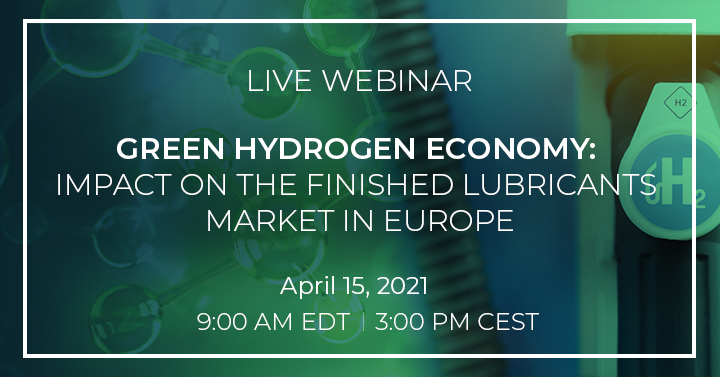EU’s Green Hydrogen Plan Accelerates Energy and Lubricants Industry Sustainability Efforts, Sees Kline
PARSIPPANY, NJ – April 13, 2021 – The green hydrogen policy, issued as part of the European Union’s (EU) COVID-19 pandemic recovery efforts, will play a pivotal role in Europe’s energy transition and have significant implications for the lubricants industry. While the transition to a hydrogen economy may reduce the consumption of finished lubricants in several sectors, it also poses an opportunity to trigger technological innovation and create demand for customized lubricants formulations, as seen from Kline’s just-published study, Emerging Green Hydrogen Economy: Impact on the Finished Lubricants Market in Europe. To learn about key findings and how green hydrogen will impact various sectors, REGISTER for our upcoming webinar.
There is not one fit-it-all solution to reduce carbon footprint. Various industries will react cautiously, adopting a mix of technological solutions. While the electrification of passenger vehicles is already growing exponentially, green hydrogen, also called renewable hydrogen, poses an alternative in hard-to-electrify sectors such as heavy-duty trucks and also buses, vessels, trains, and aircraft.
The EU plan proposes the installation of at least 2X40 GW of renewable hydrogen electrolysers by 2030, allowing 10 million tons of green hydrogen to be produced. Assuming green hydrogen targets are achieved, preliminary estimates indicate a net loss of about 12 kilotonnes of heavy-duty motor oil (HDMO) demand in Europe will be directly linked to the increasing deployment of hydrogen fuel cell trucks by 2040.
Several companies have shown interest in participating in a green hydrogen economy, including BP’s recently publicized strategy “seeking early positions in hydrogen.” Shell’s REFHYNE project will install and operate a large hydrogen electrolyser with a peak capacity of 10 MW and the ability to produce approximately 1,300 tonnes of hydrogen per year. Other European oil majors like TOTAL, ENI, and Repsol are also embarking on similar projects.
The recently launched Green Hydrogen Catapult coalition under the United Nation’s “Race to Zero” initiative is aiming to drive down the cost of green hydrogen. This drive to zero-carbon energy will present lubricants companies with multiple challenges and opportunities. “Now is the time when a growing number of lubricants companies are reinforcing efforts to assist the industries they serve in achieving their sustainability goals,” comments Sharbel Luzuriaga, project manager of Kline’s study. “Lubricants players will have to identify the emerging fluids market niches and react to new operational practices and find synergies with other transforming forces, such as the digital economy, while looking at new business models.”
Other potential applications for green hydrogen are as feedstock for fertilizer production, refining, industrial processes, and next-generation “green” steel. Leading automotive OEMs are becoming a decisive market pull force, requiring their partners in the supply chain, including steelmakers, to adopt best sustainability practices.
Among the earlier decarbonizing sectors will be the transport sector, prominently personal mobility, and freight transport given the incentives in place and the fairly high level of technological maturity. Power generation is another sector where the deployment of green hydrogen is anticipated to be fast; hydrogen is already used in natural gas blends.
In the case of steel manufacturing, the use of green hydrogen in direct reduced iron + electric arch furnace (DRI+EAF) has a nearly emission-free character and is considered the most viable option, although in the long term, since it involves the development of new technologies.
The disrupting effect of the potential use of green hydrogen in marine applications is high considering that deep-sea marine is a highly regulated segment, and onerous research and investment are needed by OEMs to develop engines that can safely run on gaseous or liquid hydrogen. However, hydrogen may play a key role in the deployment of synthetic fuels in decarbonization efforts of the marine sector.
Finished lubricants will play a central role in maximizing the carbon-mitigating benefits of green hydrogen energy. Lubricants players will have to closely explore market spaces and react promptly to the incremental needs across various emerging consumption points. More insights about the opportunities and challenges of this emerging market can be found in Kline’s just-published study, Emerging Green Hydrogen Economy: Impact on the Finished Lubricants Market in Europe.
About Kline
Kline is a worldwide consulting and research firm dedicated to providing the kind of insight and knowledge that helps companies find a clear path to success. The firm has served the management consulting and market research needs or organizations in the agrochemicals, beauty & personal care, chemicals and materials, energy, and life sciences for more than 60 years. For more information, visit www.KlineGroup.com
###
For more information contact:
Vera Sandarova
Marketing Communications
Vera.Sandarova@klinegroup.com

